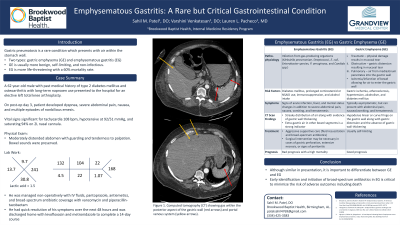Monday Poster Session
Category: Stomach
P3373 - Emphysematous Gastritis: A Rare but Critical Gastrointestinal Condition
Monday, October 28, 2024
10:30 AM - 4:00 PM ET
Location: Exhibit Hall E

Has Audio
.jpg)
Sahil M. Patel, DO
Brookwood Baptist Health
Birmingham, AL
Presenting Author(s)
Sahil M. Patel, DO, Varshini Venkatesan, DO, Lauren L. Pacheco, MD
Brookwood Baptist Health, Birmingham, AL
Introduction: Emphysematous gastritis is a rare and lethal disease characterized by air within the gastric wall, caused by gas forming microorganisms such as Escherichia coli, streptococcus species, and clostridium species, to name a few. Even when identified early, it has a mortality rate of 60%. Here we present a rare case of emphysematous gastritis that developed while the patient was admitted to the hospital for an unrelated reason.
Case Description/Methods: A 62-year-old male with past medical history of type 2 diabetes mellitus and osteoarthritis with long-term naproxen use presented to the hospital for an elective left total knee arthroplasty, which he underwent successfully. On postoperative day 3, patient developed dyspnea and severe abdominal pain accompanied by nausea and multiple episodes of nonbilious emesis. On exam, abdomen was moderately distended with guarding and diffuse tenderness to palpation, but bowel sounds were preserved. Lab studies remarkable for white blood cell count 13.7x103/L, hemoglobin 9.7 g/dL, and lactic acid 1.5 mEq/L. An emergent CT scan with IV contrast showed evidence of emphysematous gastritis with portal venous gas. Due to the high risk of iatrogenic perforation from endoscopy, he was managed non-operatively with IV fluids, pantoprazole, antiemetics, and antibiotic coverage with vancomycin and piperacillin-tazobactam. Within 48 hours, the patient’s symptoms resolved, blood cultures were negative, and he was discharged shortly afterwards to finish a 14-day course of levofloxacin and metronidazole.
Discussion: It is often challenging to distinguish between emphysematous gastritis and gastric emphysema. Gastric emphysema is an asymptomatic non-infectious process that is associated with mechanical disruption of the gastric wall (i.e., surgery, endoscopy or nasogastric tube placement). In contrast, emphysematous gastritis is a life-threatening condition often caused by a bacterial infection that arises locally or spreads hematogenously from a distant focus. In our case, the major risk factors were diabetes mellitus and chronic nonsteroidal anti-inflammatory drug use, creating a favorable environment for bacterial invasion. Although the mainstay of treatment is supportive, emphysematous gastritis can lead to severe septic shock, gastric perforation, hemorrhage, or gastric wall necrosis if not identified promptly. In such cases, emergent surgical intervention is warranted.
Disclosures:
Sahil M. Patel, DO, Varshini Venkatesan, DO, Lauren L. Pacheco, MD. P3373 - Emphysematous Gastritis: A Rare but Critical Gastrointestinal Condition, ACG 2024 Annual Scientific Meeting Abstracts. Philadelphia, PA: American College of Gastroenterology.
Brookwood Baptist Health, Birmingham, AL
Introduction: Emphysematous gastritis is a rare and lethal disease characterized by air within the gastric wall, caused by gas forming microorganisms such as Escherichia coli, streptococcus species, and clostridium species, to name a few. Even when identified early, it has a mortality rate of 60%. Here we present a rare case of emphysematous gastritis that developed while the patient was admitted to the hospital for an unrelated reason.
Case Description/Methods: A 62-year-old male with past medical history of type 2 diabetes mellitus and osteoarthritis with long-term naproxen use presented to the hospital for an elective left total knee arthroplasty, which he underwent successfully. On postoperative day 3, patient developed dyspnea and severe abdominal pain accompanied by nausea and multiple episodes of nonbilious emesis. On exam, abdomen was moderately distended with guarding and diffuse tenderness to palpation, but bowel sounds were preserved. Lab studies remarkable for white blood cell count 13.7x103/L, hemoglobin 9.7 g/dL, and lactic acid 1.5 mEq/L. An emergent CT scan with IV contrast showed evidence of emphysematous gastritis with portal venous gas. Due to the high risk of iatrogenic perforation from endoscopy, he was managed non-operatively with IV fluids, pantoprazole, antiemetics, and antibiotic coverage with vancomycin and piperacillin-tazobactam. Within 48 hours, the patient’s symptoms resolved, blood cultures were negative, and he was discharged shortly afterwards to finish a 14-day course of levofloxacin and metronidazole.
Discussion: It is often challenging to distinguish between emphysematous gastritis and gastric emphysema. Gastric emphysema is an asymptomatic non-infectious process that is associated with mechanical disruption of the gastric wall (i.e., surgery, endoscopy or nasogastric tube placement). In contrast, emphysematous gastritis is a life-threatening condition often caused by a bacterial infection that arises locally or spreads hematogenously from a distant focus. In our case, the major risk factors were diabetes mellitus and chronic nonsteroidal anti-inflammatory drug use, creating a favorable environment for bacterial invasion. Although the mainstay of treatment is supportive, emphysematous gastritis can lead to severe septic shock, gastric perforation, hemorrhage, or gastric wall necrosis if not identified promptly. In such cases, emergent surgical intervention is warranted.
Disclosures:
Sahil Patel indicated no relevant financial relationships.
Varshini Venkatesan indicated no relevant financial relationships.
Lauren Pacheco indicated no relevant financial relationships.
Sahil M. Patel, DO, Varshini Venkatesan, DO, Lauren L. Pacheco, MD. P3373 - Emphysematous Gastritis: A Rare but Critical Gastrointestinal Condition, ACG 2024 Annual Scientific Meeting Abstracts. Philadelphia, PA: American College of Gastroenterology.
